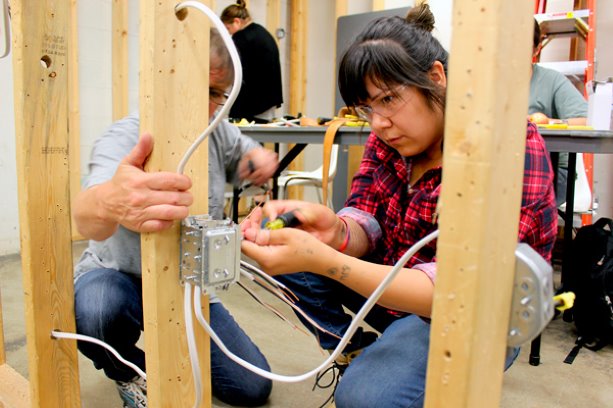When Krissy McMartin left her home on the Wahgoshig First Nation in northern Ontario for work in North Bay last year she landed a part-time job in security for the city.
But with bigger ambitions, the 36-year-old decided to take the Aboriginal Women in Trades (AWT) program at Canadore College, a 12-week course covering the fundamentals of electrical, plumbing, carpentry and building construction.
It was time well spent, setting McMartin on a path to further her education in Canadore’s electrical trade certification program.
"I have this vision of starting my own business when I graduate…and taking my new business back to my First Nation to help my people build better, sustainable houses," she says.
McMartin, who calls the AWT program "very important to us, First Nations women," is one of 30 students who have taken the program at Canadore College. While a number of the women were from North Bay, others came from as far as Attawapiskat and Fort Albany on the shore of James Bay.
Judy Manitowabi, manager of community-based and contract training at the college, has been instrumental in developing the program.
She says the course included two weeks of health and safety training plus 10 days of training in each trade.
Reading and interpreting drawings, basic plumbing and electrical installation, window/door installation and framing construction were covered.
Manitowabi says the program was organized in two cohorts of 15 women per class. Every student graduated.
She credits the success in part to the practical format.
"We wanted it to be short term so we wouldn’t lose students; we wanted it to be exploratory so they could make an educated choice (of trades)," she says.
But the framework went further.
"We wanted it to be culturally based…to offer our indigenous knowledge," she adds.
Manitowabi says a holistic approach to learning covered self-awareness and career development through the use of "a medicine wheel" — an indigenous tool for spiritual guidance.
One of the instructor’s roles was to support students, "to help keep them on track," Manitowabi explains. "They could lean on her if they needed to."
"Our teacher gave us tools to deal with the issues each one of us had," says McMartin, who graduated as valedictorian of her class.
Students received free tuition and health and safety equipment through government funding. Most students also received additional funding for travel and living expenses while in residence at Canadore.
While McMartin and others took the next step in post-secondary education, some of their fellow students landed jobs in construction, including four who are building homes in Attawapiskat.
Manitowabi is not surprised that contractors hired them, even though the 12-week course only gave them basic skills training. From a wealth of experience with employers, she knows that soft skills are an important factor in most hires.
"They (employers) appreciated those new employees that came with confidence," she said. "When these women graduated, they graduated with a lot of confidence. We wanted the course to be empowering for them."
Manitowabi says the classes of 15 were pared from upwards of 50 applicants.
"We screened for women with an actual interest in the trades," she says.
The AWT program received funding through the Ontario Poverty Reduction Fund and monies will go towards monitoring the graduates until December 2018, says Manitowabi, adding future funding is undetermined.
McMartin says the program "builds empowerment, leadership skills, confidence.
"I hope that they don’t shut it down because women can benefit from this program big time."






Recent Comments
comments for this post are closed